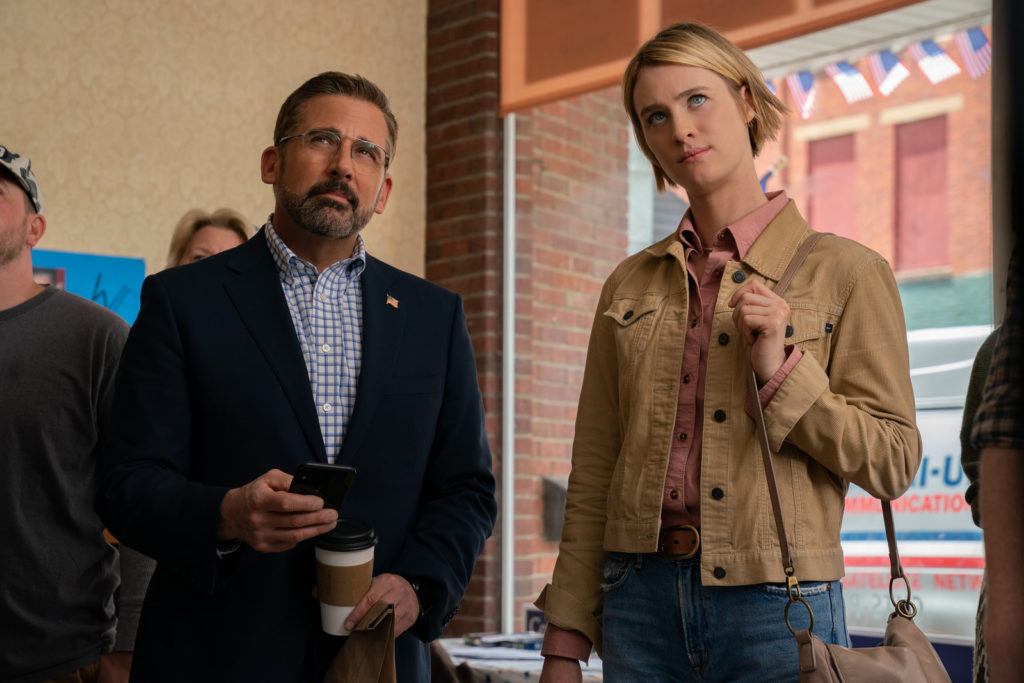Irresistible

Steve Carell and Mackenzie Davis in Focus Features' IRRESISTIBLE.
There’s a trend in which the best comedians graduate from stand-up to sketch shows, eventually to star in their own television pilot or film. The latter two is where things seem to fizzle. Jon Stewart’s been in the public consciousness as a great interviewer, sketch comedian, and trusted political commentator—in large part because so much of humor exists as a vehicle for biting social commentary.
Even comedy’s golden child, former SNL writer John Mulaney, was unable to break this pattern of square peg-banging futility with his short-lived, eponymous series. Instead, he retreated to the world of sketch weirdness with The Sack Lunch Bunch, a one-off Netflix special.
In an election year that has seen civil discord, pandemic catstrophe, and Donald Trump being, well, Donald Trump, Stewart’s directorial debut, IRRESISTIBLE, tries to break the ceiling yet again and fails miserably.
Gary Zimmer (Steve Carell) and Faith Brewster (Rose Byrne) play, respectively, Democratic and Republican campaign strategists relying on massive amounts of data to allocate resources to tip the scales of local politics from the national stage.
When the two get wind of the viral video of ‘Colonel Jack’, they head to the fictional Deerlaken, Wisconsin. A retired Marine, Jack Hastings (Chris Cooper) goes before the city council to oppose measures that would unfairly impact hardworking immigrants who have long been integral to the community.
From here, the two strategists attempt to out-scandal each other, one of many expressions of Stewart’s, and America’s, exasperation, with modern politics. Echoing similar sentiments to John Metta’s prescient 2015 op-ed in Medium, the disenfranchised here are an afterthought to affluent liberals trying to buy influence.
The intended joke is that coastal elites don’t understand the locals. The real joke is that the filmmakers don’t either. Upon arriving in Deerlaken (shouldn’t it be “Deerlachen“?), Gary’s first inclination is to order “a Bud and a burger” in a hofbräuhaus. Critic Anthony Lane was quick to point out the irony. I grew up in North Dakota and Minnesota. Beltway Millennials—especially The New Yorker-reading variety—are far more likely to be weißbeer-drinking hipsters than the Midwesterners for whom Budweiser is a second religion.
Diana (Mackenzie Davis), Jack’s daughter, checks off a few boxes as the pretty, “enlightened hick” who, we’re told, comes back to town to help out on the farm. While propping up Jack as a Not-Your-Daddy’s-Democrat in the mayoral race, Gary grows fond of Diana. So many years his junior, one remarks, “I bet she smells like Pop Tarts.”
It’s not that these towns are full of unsophisticated hicks, or, conversely, that there aren’t at least a few sophisticated ones. It’s that the political division and corrosion that so ires Stewart never surfaces in the frank terms to which we’re accustomed from his tenure on the The Daily Show. Walmart-and-Fox News mass consumption culture has homogenized, radicalized, and stripped these towns of a greater cultural depth more prevalent before my generation’s exodus to urban centers. It’s a false narrative to suggest that the “real America” isn’t in the boroughs of New York or the Deep Ellum neighborhood of Dallas. Who do you think moved there to get away from shrinking economic opportunity?
Worse, framing the story from the Dances With Banjos perspective inhibits closer examination of the isolation-incubated mindset that got us to 2020, in which people’s idea of freedom amounts to screaming about haircuts and not taking proper medical precautions. Albeit unoriginal, the “rural whites are people too” angle might be a good story to explore, any other time than now.
While filmed long before the world erupted in mass protest against the killing of George Floyd by Minneapolis police officers, the film’s release today strikes me as ill-timed. Nerves still raw from Floyd’s death and the civil unrest that followed, a much-needed national conversation about systemic racism is far from over.
But the film has nothing to say, other than an unseemly version of Trump’s infamous “on all sides” remarks about Charlottesville. This only adds to the sense that IRRESISTIBLE isn’t.